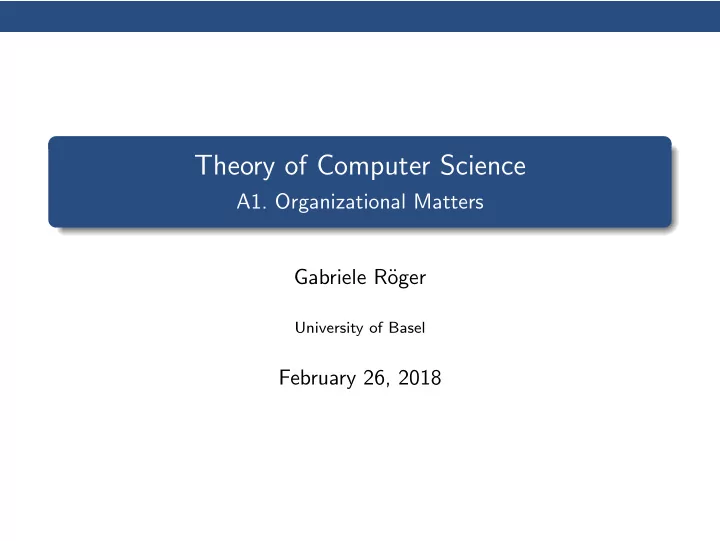

Theory of Computer Science A1. Organizational Matters Gabriele R¨ oger University of Basel February 26, 2018
Organizational Matters About this Course Organizational Matters
Organizational Matters About this Course People Lecturer Dr. Gabriele R¨ oger email: gabriele.roeger@unibas.ch office: room 04.005, Spiegelgasse 1
Organizational Matters About this Course People Tutors Dr. Guillem Franc` es email: guillem.frances@unibas.ch office: room 04.004, Spiegelgasse 1 Manuel Heusner email: manuel.heusner@unibas.ch office: room 04.001, Spiegelgasse 5
Organizational Matters About this Course Time & Place Lectures Monday: 14:15–16:00 Wednesday: 16:15–18:00 Room 05.002, Spiegelgasse 5
Organizational Matters About this Course Time & Place Exercise Sessions (starting March 5) group 1 (Manuel Heusner; in German?) time: Monday 16:15–18:00 place: room 00.003, Spiegelgasse 1 group 2 (Guillem Franc` es; in English) time: Monday 16:15–18:00 place: room U1.001, Spiegelgasse 1 important: please choose your preferences in Courses ( https://courses.cs.unibas.ch/ ) until Wednesday 23:59 (February 28)
Organizational Matters About this Course Theory Course on the Web Course Homepage http://www.cs.unibas.ch/fs2018/ main-lecture-theory-of-computer-science/ course information slides exercise sheets and additional material enrolment: https://services.unibas.ch/ deadline: March 26
Organizational Matters About this Course Course Material course material: slides (online + printed handouts) textbooks (see next slides) additional material on request
Organizational Matters About this Course Course Material Textbooks (German) Logik f¨ ur Informatiker by Uwe Sch¨ oning (5th edition) covers the part on logic, but also advanced topics beyond the scope of the course Theoretische Informatik – kurz gefasst by Uwe Sch¨ oning (5th edition) covers large parts of the course, but not the part on logic
Organizational Matters About this Course Course Material Textbooks (English) Logic for Computer Scientists by Uwe Sch¨ oning (1st edition) covers the part on logic, but also advanced topics beyond the scope of the course Introduction to the Theory of Computation by Michael Sipser (3rd edition) covers large parts of the course, but not the part on logic
Organizational Matters About this Course Target Audience target audience: B.Sc. Computer Science, 4th semester B.A. Computer Science, 4th or 6th semester as an elective or if interested in M.Sc. Computer Science degree all other students welcome prerequisites: basic proof techniques (mathematical induction, proof by contradiction, . . . ) basic programming skills
Organizational Matters About this Course Exam written exam, 8 ECTS credits June 15, 14:00–16:00 (room 00.003, Spiegelgasse 1) admission to exam: no prerequisites must register for exam during April 9–23 � see https://philnat.unibas.ch/examen/ grade for course determined exclusively by the exam if you fail: one repeat attempt in FS 2019
Organizational Matters About this Course Exercises Exercise sheets (homework assignments): mostly theoretical exercises some programming exercises Exercise sessions: live exercises questions about exercise sheets questions about the course participation voluntary but highly recommended
Organizational Matters About this Course Exercises exercise sheets on course homepage every Wednesday may be solved in groups of arbitrary size (recommended: 2–3) due Wednesday the following week (pigeon holes Spiegelgasse 1 or upload to Courses) scans must be legible (no photos, please) we appreciate L A T EX submissions
Organizational Matters About this Course Plagiarism Plagiarism (Wikipedia) Plagiarism is the “wrongful appropriation” and “stealing and publication” of another author’s “language, thoughts, ideas, or expressions” and the representation of them as one’s own original work. consequences: 0 marks for the exercise sheet (first time) exclusion from exam (second time) if in doubt: check with us what is (and isn’t) OK before submitting exercises too difficult? we are happy to help!
Organizational Matters About this Course Plagiarism Plagiarism (Wikipedia) Plagiarism is the “wrongful appropriation” and “stealing and publication” of another author’s “language, thoughts, ideas, or expressions” and the representation of them as one’s own original work. consequences: 0 marks for the exercise sheet (first time) exclusion from exam (second time) if in doubt: check with us what is (and isn’t) OK before submitting exercises too difficult? we are happy to help!
Organizational Matters About this Course Questions on Organization Questions?
Organizational Matters About this Course About this Course
Organizational Matters About this Course Contents Theoretical foundations of computer science A. background ⊲ mathematical foundations and proof techniques B. logic (Logik) ⊲ How can knowledge be represented? ⊲ How can reasoning be automated? C. automata theory and formal languages (Automatentheorie und formale Sprachen) ⊲ What is a computation? D. computability theory (Berechenbarkeitstheorie) ⊲ What can be computed at all? E. complexity theory (Komplexit¨ atstheorie) ⊲ What can be computed efficiently?
Organizational Matters About this Course Learning Goals understanding the capabilities and limitations of computers working with formal systems comprehending formal definitions and theorems precise formulation of definitions, theorems and proofs analyzing formal problems precisely differentiating statements within a system from statements about a system
Organizational Matters About this Course Warning “Wer’s nicht gewohnt ist, f¨ ur den ist es ungewohnt.” (Prof. Dr. Th. Ottmann) [If you are not used to it, it may be unusual for you.] stay on the ball do the exercises pay attention to details ask questions!
Organizational Matters About this Course Warning “Wer’s nicht gewohnt ist, f¨ ur den ist es ungewohnt.” (Prof. Dr. Th. Ottmann) [If you are not used to it, it may be unusual for you.] What can you do? stay on the ball do the exercises pay attention to details ask questions!
Organizational Matters About this Course Warning “Wer’s nicht gewohnt ist, f¨ ur den ist es ungewohnt.” (Prof. Dr. Th. Ottmann) [If you are not used to it, it may be unusual for you.] What can you do? stay on the ball do the exercises pay attention to details ask questions!
Organizational Matters About this Course Questions about the Course Questions?
Recommend
More recommend